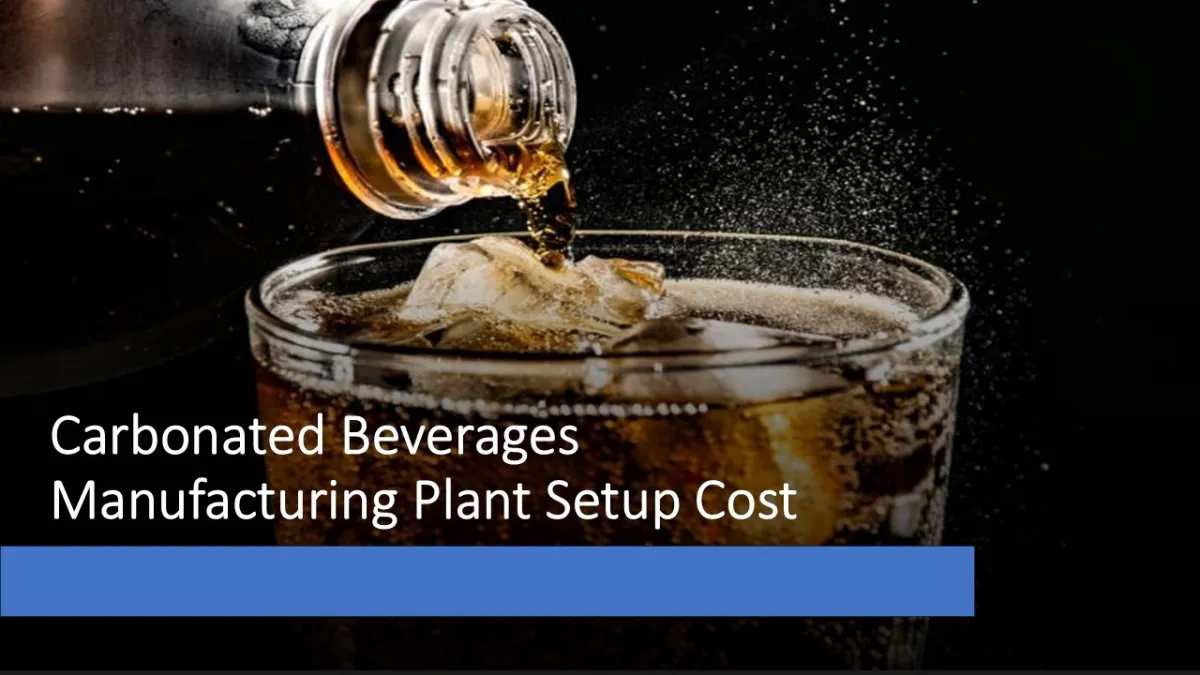
Carbonated Beverages Manufacturing Plant Setup 2025: Project Report, Business Plan, Raw Materials, And Cost Analysis
A carbonated beverages production plant requires bottling lines, carbonation units, mixing tanks, and quality control systems, along with storage and packaging facilities. The setup involves sourcing raw materials like water, sweeteners, flavors, and CO2. Skilled technicians, compliance with food safety regulations, and efficient logistics are crucial. With growing demand for diverse drinks, such a plant presents strong opportunities in both domestic and international markets.
IMARC Group's report, titled “Carbonated Beverages Manufacturing Plant Setup Cost 2025: Industry Trends, Plant Setup, Machinery, Raw Materials, Investment Opportunities, Cost and Revenue,” provides a complete roadmap for setting up a Carbonated beverages manufacturing plant. It covers a comprehensive market overview to micro-level information such as unit operations involved, raw material requirements, utility requirements, infrastructure requirements, machinery and technology requirements, manpower requirements, packaging requirements, transportation requirements, etc.
Carbonated Beverages Industry Outlook 2025
The carbonated beverages industry is projected to exceed USD 275 billion by 2025, driven by urbanization, lifestyle changes, and rising demand for ready-to-drink products. Growth is fueled by innovations in low-sugar and functional beverages as health-conscious consumers seek healthier options. Emerging markets in Asia-Pacific and Africa are experiencing rising consumption due to population growth and increasing disposable incomes. However, regulatory pressures related to sugar content and sustainability are reshaping the industry, pushing companies toward eco-friendly packaging and healthier formulations.
Request for a Sample Report : https://www.imarcgroup.com/carbonated-beverages-manufacturing-plant-project-report/requestsample
Key Insights for Setting Up a Carbonated Beverages Manufacturing Plant
Detailed Process Flow
-
Product Overview
Unit Operations Involved
Mass Balance and Raw Material Requirements
Quality Assurance Criteria
Technical Tests
Project Details, Requirements and Costs Involved:
-
Land, Location and Site Development
Plant Layout
Machinery Requirements and Costs
Raw Material Requirements and Costs
Packaging Requirements and Costs
Transportation Requirements and Costs
Utility Requirements and Costs
Human Resource Requirements and Costs
Capital Expenditure (CapEx) and Operational Expenditure (OpEx) Analysis:
Project Economics:
-
Capital Investments
Operating Costs
Expenditure Projections
Revenue Projections
Taxation and Depreciation
Profit Projections
Financial Analysis
Profitability Analysis:
-
Total Income
Total Expenditure
Gross Profit
Gross Margin
Net Profit
Net Margin
Key Cost Components
. Land and Infrastructure: Cost of land acquisition, plant construction, water treatment units, and storage facilities.
. Machinery and Equipment: Carbonation units, mixing tanks, bottling lines, labeling machines, and quality control systems.
. Raw Materials: Water, flavors, sweeteners, CO2, preservatives, and packaging materials (bottles, cans, caps).
. Labor and Workforce: Hiring, salaries, and training of machine operators, technicians, and quality controllers.
. Technology and R&D: Product innovation, low-sugar formulations, and flavor development.
. Utilities: Electricity, clean water, refrigeration, and gas supply.
. Quality Control and Testing: Safety testing labs, certification processes, and hygiene compliance.
. Packaging and Logistics: Bottles, cans, crates, transport facilities, and distribution channels.
. Regulatory and Compliance Costs: Food safety certifications, licenses, environmental clearances, and labeling standards.
Economic Trends Influencing Carbonated beverages Plant Setup Costs 2025
. Health-Conscious Trends: Rising demand for sugar-free and functional drinks influencing production costs.
. Raw Material Price Volatility: Fluctuations in sugar, CO2, and packaging material costs.
. Eco-Friendly Packaging Shift: Growing costs due to demand for recyclable and sustainable packaging.
. Urbanization and Lifestyle Changes: Increasing demand in emerging economies boosting production scale.
. Global Supply Chain Dynamics: Import/export tariffs and transport costs impacting raw material sourcing.
. Technological Advancements: Automation and smart bottling technologies reducing long-term costs.
Request For Customization: https://www.imarcgroup.com/request?type=report&id=27302&flag=E
Challenges and Considerations for Investors
. High Competition: Dominance of global brands creates entry barriers.
. Health Regulations: Strict rules on sugar content, labeling, and marketing restrictions.
. Consumer Preferences Shift: Growing inclination toward healthier beverages reduces traditional soda demand.
. Sustainability Pressures: Rising costs for eco-friendly packaging and waste management.
. Capital Intensive Setup: Significant upfront investment in machinery and infrastructure.
. Distribution Challenges: Building strong networks in competitive beverage markets.
Conclusion:
The carbonated beverages industry continues to thrive in 2025, supported by urban demand, innovation in healthier options, and rising disposable incomes in developing markets. While challenges such as health regulations, sustainability costs, and competition persist, opportunities exist for investors who focus on product diversification, eco-friendly practices, and efficient distribution networks. With the right strategy, a carbonated beverages plant can offer long-term profitability and global growth potential.
About Us:
IMARC Group is a global management consulting firm that helps the world's most ambitious changemakers to create a lasting impact. The company excel in understanding its client's business priorities and delivering tailored solutions that drive meaningful outcomes. We provide a comprehensive suite of market entry and expansion services. Our offerings include thorough market assessment, feasibility studies, company incorporation assistance, factory setup support, regulatory approvals and licensing navigation, branding, marketing and sales strategies, competitive landscape, and benchmarking analyses, pricing and cost research, and procurement research.
Contact Us:
IMARC Group
134 N 4th St. Brooklyn, NY 11249, USA
Email: sales[@]imarcgroup.com
Tel No:(D) +91 120 433 0800
United States: (+1-201971-6302)
Legal Disclaimer:
MENAFN provides the
information “as is” without warranty of any kind. We do not accept
any responsibility or liability for the accuracy, content, images,
videos, licenses, completeness, legality, or reliability of the information
contained in this article. If you have any complaints or copyright
issues related to this article, kindly contact the provider above.


















Comments
No comment